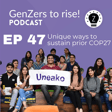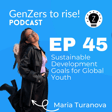Become a Creator today!Start creating today - Share your story with the world!
Start for free
00:00:00
00:00:01

COP26 latest news
On this episode we are covering COP26 UN's climate conference and we are presenting the most important subjects. This episode's guests are two climate activists and Science Communication Leads at ClimateScience, an educational charity with a focus on climate solutions. Ghislaine Fandel and JP Arellano are talking about the climate finance, youth's activism, energy transmission and the new transportation techniques mentioned at COP26. You are free to ask any questions related to climate change, COP26 etc. to the unique platform built only for this episode at https://bit.ly/313yoDU.
Follow ChangemakerZ at https://go.changemakerz.org/follow
Episode's page: https://podcast.changemakerz.org/cop26
Produced by Vasilis Skarleas
Transcript
Introduction to Changemaker-Z
00:00:01
Speaker
Hello everyone, I'm Kennedy. And I'm Vassilis. We run Changemaker-Z, a student-run initiative that aims to empower, educate, and connect Gen Zers interested in entrepreneurship. We interview teenagers with impactful projects and create resources to help you change the world. If they can't do it, so can you.
00:00:23
Speaker
On this podcast, we discuss the logistics of creating different types of projects with Jin Ziers who have already done it. We will leave our social media and website information in the description.
00:00:46
Speaker
Welcome,
COP26 and its Significance
00:00:47
Speaker
everyone. I'm pretty sure that all these past days, you have listened somewhere to the COP26 initials corresponding to one of the biggest environmental events for 2021. Today, we're here with Guilin, Fondelle, and JP Ariando to comment and talk about some of the most important subjects of the United Nations Climate Change Conference that took place in Glasgow between October 31st through November 12th.
00:01:10
Speaker
Before we start, we have some exciting news to share with you today. The Changemaker-Z app is now released on the App Store in which you can find every section of the podcast and many more exciting features. It will be available on the Play Store soon. Now, let's introduce this episode's guest. We'll be speaking with Galen Fondell. Hi, everyone. I'm Galen. I'm a Science Communication Lead and Content Director at Climate Science.
00:01:33
Speaker
And hi, folks. My name's JP. I use him pronouns, and I'm also a content director at Climate Science. And we've been keeping up to date with a lot of the stuff that's been going on at COP recently. Yes, they are two climate activists and science communication leads at Climate Science, an educational charity with a focus on climate solutions. We're so happy to have you guys here today. We're excited to talk about COP.
00:02:00
Speaker
Kennedy, I love your enthusiasm. Thank you very much, both Ghislaine and JP for being here.
Climate Finance Challenges
00:02:07
Speaker
So in our first meeting, we had mentioned some guidelines that we want to cover in this episode. And through this episode, we will go through the climate finance, the transportation and the energy transformation subjects that were also introduced on the Code 26 and tell us
00:02:29
Speaker
We had discussed about climate finance, but what exactly is it? So when we talk about climate finance, essentially we're talking about the funding that goes towards mitigating and adapting to climate change. So when I mentioned the public and private sector, it's because we need funding from the public sector, which would mean governments, for example, and the private sector, which would mean corporations and companies.
00:02:55
Speaker
So over the last 12 years, we were expected to see a hundred billion dollars per year from the public sector going towards helping countries who cannot afford to mitigate and adapt to climate change and also shouldn't be bearing the burden of doing so. And high income countries essentially failed to provide the necessary funding.
00:03:21
Speaker
And so COP26, this was such a big conversation because they had to reassess the funding that they were going to provide towards these low and middle income countries and set out new goals for the future.
Mitigation vs. Adaptation
00:03:35
Speaker
And we want to clarify for the audience that when we're talking about mitigation, that essentially means reducing emissions, right? So that means doing anything we can to actively reduce emissions. So that means installing solar panels, that means replanting forests, that means
00:03:52
Speaker
decarbonizing industries like steel, automobiles, et cetera. And when we talk about adaptation, we talk about being ready and prepared for the eventual effects that will come across from climate change. I mean, we're already seeing a lot of them, right? The floods in BC and India.
00:04:09
Speaker
the famine in Madagascar, et cetera, those are things that are happening now and are only going to get worse. So we have to be able to adapt to those challenges. And the reason that we put a lot of focus on high income countries is that if you look at historic emissions, for example, of all of the emissions that have ever, ever been emitted by the human race, 25% of them have come from the United States alone. For example,
00:04:37
Speaker
And we know, I think everybody listening here knows that 330 million people, the population of the United States is not 25% of the population, right? Not even close. And, you know, you see similar figures for countries in Europe, places like Australia, Canada, et cetera, that have made it significantly more per capita in historical terms than a lot of low-income and developing and low- and middle-income nations.
00:05:03
Speaker
And that is why a lot of the burden should be placed on these high-income nations that are the main causes of these effects, but are not feeling most of the effects themselves. Besides from maybe like Australia and Southern US, most of Europe will be fairly okay. Obviously nowhere is going to be okay, but they're not going to face the worst impacts that we're going to see in, for example, Southeast Asia, Sub-Saharan Africa, South America.
00:05:32
Speaker
places where they haven't admitted a lot and they're going to face the worst consequences. And we do hear a lot of the blame being, not blame, but a lot of the responsibility being put on high inclinations. That is, that is why. Yeah.
China's Role in Climate Finance
00:05:44
Speaker
And, you know, it's not just a matter of where they're located and,
00:05:48
Speaker
you know whether they're going to be affected but it's um so for example when we talk about the adaptive capacity of a country it's how well they can adapt to climate change right so it's not just you know how the exposure is measured as a result of their ability to pay for adaptation measures um you know so uh cities for example that are located on coastlines in high-income countries are less likely to be exposed
00:06:14
Speaker
than cities that are looking off coastlines in low and middle income countries, right? So that's where all, you know, having to pay for these things comes in. And part of that is the inequality side of it. And that's, you know, they don't deserve to have to pay for these repercussions of the actions of high income countries. But on top of that, you know, a lot of these countries are in debt. A lot of these countries just flat out cannot pay for this. And it would take such a blow to their economies.
00:06:43
Speaker
to have to do so. So it's a really, really, really critical part of talking about climate change is how to pay for it. And the most important fact is that these rich countries got rich because they needed so much because they took labor, they took energy, they took capital, they took land and resources from these low-income and middle-income countries, right? Essentially leaving them with dirt, with almost nothing, so that
00:07:12
Speaker
Exactly. Now they just can't afford it. They just don't have the resources nor the capital to be able to mitigate and adapt in necessary ways. May I ask which is the position of China in this whole situation? Yeah, so in terms of climate finance, I'm not entirely well versed on how much funding China is getting. But it's an interesting situation because within China, the disparity between
00:07:42
Speaker
the lower class and the higher class is enormous. So it's important to look at both the funding within the country and outside of it. Right now, China is the first most polluting country in the world. Historically, it is not. But even without those historical omissions, it still carries some sort of the responsibility towards providing funding
00:08:11
Speaker
towards climate finance. Right. And at the same time, so sorry, did I get that right? You mentioned that, yes, they're leaning in solar panels, but because of so much smog and pollution, they're not as efficient. So did I catch that right? That's actually extremely interesting. I actually hadn't heard about that before, because it can get quite complicated, right? When a lot of people see countries like
00:08:35
Speaker
China and India being like, well, they have billions of people, right? They're emitting so, so much, right? When you look at a per capita basis, it's not the case, right? It's nowhere near the case to the cases that to the people in, for example, North America or Europe. And when you look at the expansion of, you know, renewable energy and things like that, they're actually expanding at a much faster rate than they are, obviously, because they need a lot more power than then some of the nation's
00:09:03
Speaker
that we've talked about before in Europe or North America. However, nobody's going away scot-free. It's everybody's fault, right? We're not pointing fingers and we don't want to blame anybody. We just want to highlight the inequality and the
00:09:17
Speaker
climate justice of it all to adequately proportion responsibility. But China still has
China's Energy Paradox
00:09:24
Speaker
role to play. The fact that they don't want to shut down their power, their stop funding coal power plants within their nation is problematic. It's extremely problematic. And if we don't manage to convince China to stop doing that within before 2030, we may not very well have a shot at 1.5, to be totally frank, because China
00:09:45
Speaker
produces so much of their energy with coal. But at the same time, you also have to put yourself in the shoes of Chinese politicians, for example. What do they want? Well, they want their people to prosper. They want their people to afford to live the lives that the Europeans are living, that the North Americans are living. They just want the best for their people. And how do they do that as cheap and efficiently as possible? Well, it's with coal. It's with
00:10:14
Speaker
dirty fossil gas, et cetera. I'm not justifying what they're doing, but when you put yourself in their shoes, obviously it makes sense for everybody to be doing what they are. What they don't think about is the longer term picture. It's like, okay, well, this is good for my citizens now, but it might not be good for them 20, 30, 50, 70 years down the line. And it's very hard for human minds to focus on such long-term things because we don't tend to be around for very long.
00:10:44
Speaker
And it's like, oh, yeah, it'll be their problem. It won't be mine, is a lot of the mentality that we see. But no, you're totally right. There needs to be more political will from everybody, including China, most definitely China. Because, I mean, for example, if you get the EU, US, and China to be in a pact of a carbon market or legally binding carbon reductions, then almost everybody will have to follow suit because they make almost everything.
COP26's 1.5°C Target
00:11:10
Speaker
Basically, like,
00:11:11
Speaker
Gone are the days where you can just sit back and be like, oh, I, you know, this is not in my future. I don't have to worry about this. You said 2030. I'll be what, like 25 or something like that. And like, also I heard you mentioning the 1.5 when I was researching COP. Well, first of all, can we just like kind of clarify what COP 26 is? And also like, what, what's so important about the 1.5?
00:11:42
Speaker
Yeah, so COP26 is the Conference of Parties, and so this is something that
00:11:49
Speaker
happens once a year, this is really just the place for all of the world leaders for, you know, but leaders within the public and both the private sector, for activists to come together and to decide on what future pledges are going to look like, and kind of map out the course for 1.5. And the reason we stick to 1.5 and the 1.5 number is a kind of a
00:12:19
Speaker
contentious number just because we fight for 1.5 because even 0.5 of a degree more means increased loss of biodiversity, means even more extreme weather events, you know, means greater inequality even, you know, and so we want to try to limit this as much as possible. And the reason I say that it's contentious is because 1.5 is really hard.
00:12:45
Speaker
to meet at this point. And with current pledges, we are not set out to reach 1.5. And that was kind of the conclusion that a lot of us came out of COP26 with is, you know, was this worth it? Was this a failure of a COP because we're not meeting 1.5 with these current pledges? But sticking to a 1.5 goal is incredibly important because, like we said earlier, it's low and middle income countries that are going to be affected the most.
00:13:14
Speaker
It's very easy for a high-income country to say, well, why don't we just try for two degrees Celsius? Because they have the funding and the means to be able to adapt to a world of two degrees. It's a very short-sighted view to say that we should be limiting warming to two degrees instead of 1.5 degrees in my opinion.
00:13:36
Speaker
Just for a little bit more context, folks, we measure this 1.5 compared to a baseline of pre-industrial emissions. So that's about, you know, 1750s to 1850s. You know, we have recorded data of what the average temperature around the world was like then, and we can clearly see that it's been slowly and now increasingly rising throughout the world. So when we're talking about 1.5, we're not talking about, look, outside today, it's maybe negative 3 degrees here in Montreal. Tomorrow, it might be negative 5, right?
00:14:03
Speaker
We're not talking about that kind of day-to-day difference. We're talking about a global average difference. So, scientists all around the world, in Ghana, in China, in Russia, in the US, in Chile, etc., they're all taking constant measurement data, trying to average out the temperature of the world. Right now, the average temperature is about 14 degrees Celsius.
00:14:23
Speaker
which is about 1.1 to 1.2 degrees Celsius higher than it was in pre-industrial times. And right now it's dangerous, right? We're at 1.1 degrees and that is already dangerous. We're already seeing famines and natural disasters on a scale that we haven't seen before. 1.5 is dangerous, is unimaginably dangerous.
00:14:46
Speaker
It's a big, big difference because these differences aren't linear. And, you know, when we compare 1.5 to 2 degrees, for example, that is half a degree. Human beings can't even perceive, like, I don't even know how I would perceive that difference, you know, from the temperature outside. But the difference is so vast.
00:15:02
Speaker
You know, I'll throw some quick facts at you folks. In a 1.5-degree world, about 13.8% of the population will be exposed to severe heat waves at least once every five years. You know, the type that we saw in British Columbia, for example, this summer. If we get to 2 degrees Celsius, this fraction of the population is three times larger. That's almost 40% of the global population. That's close to 2 billion people.
00:15:32
Speaker
And it's not just people, though. In a 1.5 degree world, we're going to lose about 70% of the coral reefs in the world. Without a doubt. There's no question about it. That is a fact. In a 2 degree world, 99% of coral reefs are gone. All of them. All coral reefs in the world would be essentially gone. You couldn't go scuba diving and seeing coral reefs because it just won't exist in a 2 degree world. It's just not feasible for them to do that.
00:15:59
Speaker
And when we talk about rising sea levels, sometimes we don't even know because of the complexity of the climate system and how ocean currents move and air currents as well. We just don't actually know what the feedback loops will look like at such high degrees of temperature. So we might be totally off in the sense that it might be much, much worse.
00:16:22
Speaker
than it is. But I want to take a step back and mention to folks, look, this is a lot of doom and gloom talk.
Political Will and Climate Solutions
00:16:28
Speaker
And I'm really not for that kind of gloom and doom talk. And I want to let you folks know that today, if we wanted to, if all politicians agreed, if all business leaders agreed, et cetera,
00:16:38
Speaker
We could, not easily, but we could quickly decarbonize our entire industry, particularly in the global north and eventually in the global south. We have the technology available today. It's possible. We can fix climate change, and we are slowly fixing climate change.
00:16:57
Speaker
What is missing is political will and financial incentives, which is unfortunate. But I want you folks to know it is not doom and gloom. There is hope. There is people working on this, around the clock. Gillette and I are working on this, around the clock, trying to educate folks, you know, to raise awareness so that people vote for the people who prioritize the climate, or that people, you know, it's called voting with your wallets, right? You buy things that are more sustainable, that are more resilient, or will last longer, etc.
00:17:27
Speaker
So there's hope. Things will be gloomy if we don't act, but there is still time and there's still opportunities to fix this. This reminds to me like there is a documentary called Before the Flood and it represents DiCaprio who is, I have not mistaken, president of the committee for the nature in the UN.
00:17:56
Speaker
I don't remember exactly. Never mind. And there is an interview with an astronaut in NASA, and they are discussing about that if we stop right now burning, falling fuels, then the whole globe will start becoming more cold and becoming in the natural and normal levels. And this will bring us to the next subject.
00:18:22
Speaker
There are some other ways because it's too difficult to put all this effort to change all these political views and ventures from one day to another.
Electric Vehicles vs. Public Transport
00:18:34
Speaker
And there is this one we called the transportation in public sector to become even more decarbonized, to electrifying the public transportation cars. Yeah.
00:18:52
Speaker
So when it comes to the transportation sector, and this is something that I was genuinely disappointed in with COP26, was the amount of focus on electrifying vehicle fleets and electrifying the transport sector generally, rather than putting more focus on public transportation, for example, you know, which would seem like a very common sense thing to go to is that, you know, to reduce the amount of cars on the road,
00:19:21
Speaker
Why don't you put people in the same car, which would be good for us? And that still comes with having to electrify vehicle fleets and that we can electrify public transportation itself. But a lot of COP26, in fact, most of the conversation around transportation was on electrifying cars that people would drive.
00:19:45
Speaker
And as a result, a lot of leaders in the automobile industry were invited to have those conversations. And then things like that can lead to special interests becoming involved in the decisions that are made for the planet and that are affecting people all over the world. So when we talk about solutions to transportation, it's really, really, really important to note that the
00:20:11
Speaker
There's not just one solution. It is not just to go to electric cars entirely. Yes, we need to move away from, um, from, uh, petrol powered, um, vehicles. Um, but we also need to be putting funding towards public transportation as well. And, you know, so that comes with, um, the lowest carbon modes of transportation, which are walking and cycling.
00:20:37
Speaker
And cities right now are built for cars, around cars, entirely. And city planning is entirely focused on building these roads, on kind of spreading out cities. In the US, for example, I grew up in Miami. Miami is going to be decimated by climate change in the future. And this is a city that is
00:21:06
Speaker
entirely spread out. There's no almost relatively no public transportation walk anywhere. There's no cycle anywhere. You know, and this is, that's just one example. It's all over the world. It's something that I think the automobile industry has had a lot of
00:21:23
Speaker
say in is how we plan out our cities and ensuring that people need cars to get from place to place, you know, which affects people of different classes differently, you know, because now people have to pay for their cars to get into their job, for example.
Public Transport Investment
00:21:41
Speaker
And it leads to increased emissions.
00:21:43
Speaker
So by allowing them into the conversation about what we do about the transportation sector, of course we're going to come out with the solution being, let's just electrify everything and now we'll just sell electric vehicles rather than focusing on public transport and meeting the actual needs of citizens who may very well prefer to be cycling to work or to be walking.
00:22:08
Speaker
And to add on to that, the folks think that you can't get around with a bike. You're like, Oh, I've got kids. So I got to go do groceries. Oh, etc. Google a cargo bike. These things are awesome. They're like, sturdy, they can even be electric. You know, they've got a solid frame and you can put a whole huge basket of two or three kids riding on it at the same time. I've seen a lot of people riding here in Montreal,
00:22:34
Speaker
And even in the winter, like I ride my bike in minus 25 degree weather, you know, like it sucks, but it's possible, right? And if only their buses were a lot better, I'd probably be using it more. No, but what Gilen is saying is a big point. There's too much focus on individual electric vehicles.
00:22:55
Speaker
and that's allowing vested interests like Tesla, Ford, et cetera, Volkswagen, to play too much of a large role in the conversation, saying, yeah, guys, let's subsidize all these electric cars, like to make sure everybody has got their own electric vehicle. Whereas, I think everybody here agrees that cars suck. I hate having to wait to cross the road, and all so much space is devoted just so cars can drive around, and where it could be,
00:23:25
Speaker
green corridors, parks, open spaces, spaces for the arts, et cetera. But no, it's all for these damn cars. And if we could really put a lot more focus on electrifying public transport and on getting people to very, very low carbon use vehicles like cargo bikes and even just making things easy to access. For example, like the mayor of Paris,
00:23:51
Speaker
Miss Ivaluo, one of her commitments is to make Paris a 15-minute walkable city. That you can get to anything that you may need, a hospital, a park, a store, whatever, in 15 minutes. Anywhere that you live in the city, right? So that you don't need a car. There's no point in having a car, because you could get everywhere you need within 15 minutes of walking. Yeah, but those are our thoughts on transport. A lot of people have very different ideas and opinions.
00:24:21
Speaker
Yeah, I'm sure that there are many, many different perspectives through the subject. The idea and the point that I'm keeping is that when we are like, like when we talk about electrifying the cars fleet, and actually, we promote even more the users to consume, like to change their cars and change to electric car. And then again, in order to produce all these cars, then we will
00:24:49
Speaker
waste much, much more energy. And this comes to the next subject, the energy transmission, like in the agricultural sector, all the electricity for our cities. And which are the committed countries that they have a way and they can control this energy transmission sector.
Energy Transition Challenges
00:25:11
Speaker
Yeah. So one of the big things with energy is that a couple of these sectors,
00:25:19
Speaker
are very hard to decarbonize. Well, some of them are less using an energy more on chemical processes, so I guess I'm going to attempt. Let me repeat that. If you can cut this out later.
00:25:36
Speaker
When energy is probably the most difficult subject when it comes to climate, 76% of emissions come from energy, whether it's used in agriculture, used in our cars, used to heat our homes, et cetera. One of the biggest uses is our buildings, our commercial residential buildings that probably have pretty poor insulation, have pretty poor, not efficient heating or cooling, et cetera. That is just guzzling and guzzling away energy.
00:26:05
Speaker
One of the other aspects that makes this topic really, really hard is that a lot of countries have a lot of fossil fuels and have a lot of vested interests in making sure that people keep using these fossil fuels, right? You know, if you talk to somebody in Saudi Arabia or Russia, they have a much different idea than someone in Uruguay, where Uruguay has absolutely no fossil fuels. And they're like, yeah, we got to get rid of them completely quickly. But for example, places like the UAE,
00:26:33
Speaker
their citizens enjoy tax free country, right? Because a lot of the government revenue doesn't need to come from people's incomes. It comes from the oil industry, right? It's nationalized and they sell it. So we've essentially, I mean, a lot of scientists have come to realize that cops and these kind of treaties
00:26:56
Speaker
to phase out coal and to make out these carbon markets, et cetera, just really aren't going to cut it. They're not going to decrease in fossil fuel use as quickly as we need, particularly because none of these things are really legally binding. And there's very few countries that are willing and committed to totally phase out fossil fuels. For example, the United States was a big champion at COP and was like, yeah, we got to decarbonize as fast as possible. Biden is like, I'm not Trump. I believe in this.
00:27:25
Speaker
and this is so important and et cetera. And then literally a couple of days after COP finished, the Biden administration leased out the biggest ever plot of land in the Mexican Gulf for gas and oil drilling, literally days after COP. So it's not going to work. I'm sure Biden has good intentions. I'm sure he wants to help the environment. But
00:27:50
Speaker
there are fossil fuel interests embedded in all of our politics. So something that I've seen come up a lot is a fossil fuel non-proliferation treaty. Now, if that rings a bell, it's because you've probably heard of a nuclear weapons non-proliferation treaty, which happened during the peak of the Cold War, where the United States and Russia were trying to essentially decrease the amount of nuclear weapons in the world.
00:28:16
Speaker
they wanted to phase out completely the amount of nuclear weapons that there could be. This was a legally binding kind of agreement. Many scientists and organizations and prominent activists are pushing for countries to join a fossil fuel non-proliferation treaty where essentially they want to
00:28:40
Speaker
do everything possible to make it legally binding that countries have to transition away from carbon-intensive fuels, right? That's not completely possible for all nations, right? It really depends on how much hydropower you can have, how much nuclear power you have available right now, et cetera, because I'm sure you folks know that wind and solar are very variable and aren't able to cover the entire grid due to the sun not shining at night and the wind not always being blowing.
00:29:07
Speaker
So you do need some sort of nuclear or hydro or fossil gas to kind of offset that. Unless somebody smells fusion, dear listeners, please smell fusion. So that's one big way that folks are trying to limit the use of fossil fuels. And this is just me speculating, but I really would not be surprised
00:29:34
Speaker
if at some point in the future we start seeing individual citizens taking matters into their hands, right?
Nationalizing Fossil Fuels
00:29:42
Speaker
Like flying drones into fossil fuel infrastructure or taking down power lines and stuff like that. I'm not advocating for anything like that. Please, for the record, I don't condone violence. But it wouldn't surprise me. It wouldn't surprise me. People are affected in this way and start trying to literally just destroy fossil fuel infrastructure.
00:30:03
Speaker
And the last other big one that I totally truly support is the nationalization of the energy industry, just like we nationalize essential services. I mean, depends on the country, but, you know, stuff like education, health care, water,
00:30:18
Speaker
Shelter, a lot of that stuff is nationalized, right? The government controls it, because they're basic needs, right? They're basic necessities. They're stuff that citizens need. If we were to nationalize the fossil fuel industries, the fossil fuel companies, make them be owned by the governments, then there would be no more vested interests, right? It would be like, okay, we own them. Let's try and get them to transition away from fossil fuels as quickly as possible. We can set quotas. We can stop their disinformation campaigns. We can stop their horrendous and extremely dangerous greenwashing
00:30:50
Speaker
and try to really grab a hold on the situation. Yeah, but again, these are all very, very, I mean, some people call them radical, some people call them non-radical enough, but they're far out ideas, you know, and I don't see many of them happening anytime soon, but it's some of the only ways that I truly see us decarbonizing our energy industry quickly enough.
00:31:19
Speaker
Yeah, put that in the context of COP26.
Affordable Energy for Developing Nations
00:31:23
Speaker
All of the focus was on coal specifically and phasing out coal entirely. And a lot of countries committed to this, but like JP said, a lot of countries backtrack after just talking about phasing out coal. And then, for example, the United States
00:31:43
Speaker
who didn't pull out of a pledge like that, but, you know, acted almost against it. Poland pulled out just a few days later. And so when we talk about the energy transition, like Judy mentioned, it's also, you know, we have to consider the energy mix for different countries, something that's going to be different for every nation, especially in the fact that a lot of countries cannot
00:32:08
Speaker
transition as quickly as others. So, for example, low- and middle-income countries right now are focused more on using fossil fuels for the sake of development. And that's a major topic in development in that all these high-income countries got to where they are today through the use of fossil fuels. And so why should low- and middle-income countries have the same opportunity to develop through the use of fossil fuels? However,
00:32:39
Speaker
these high-income countries using fossil fuels to develop led to climate change. So obviously we can't have other countries going down the same path. And that's something that's also really critical to the energy transition is that we ensure that this is something affordable for these countries to ensure that instead of using fossil fuels heavily to gain electricity in their countries that they have access to renewable energy and that they have the funding to
00:33:09
Speaker
transition themselves to renewable energy and rely on that rather than going down the same path that the high-income countries did. Thank you so much.
Youth Activism in Climate Policy
00:33:18
Speaker
I know that this whole conversation has brought awareness to people like me who didn't really know much about COP and particularly COP26 and hope we can empower youth activism and go against the huge mal-information that exists around the subject.
00:33:37
Speaker
This was an amazing conversation and we hope that it helped everyone that is listening right now to understand a little bit better the importance of COP26 as well as to understand what we mean when we talk about climate finance, energy transition, transportation techniques and so on. And of course, if you have any questions, you can ask them on the unique online community that we created for this specific episode. You can find the link in the description. But for now, I would like to say a huge thanks
00:34:04
Speaker
to Ghislaine and Jamie for being part of this amazing conversation. Of course. It was really a pleasure to talk about this and I hope that, you know, something to take away for those listening is that it's very important to be critical.
00:34:21
Speaker
of the decisions that are being made by our world leaders that are on behalf of the climate of the natural world of people everywhere. And now we do have the solutions and we are ready to solve climate change. And it is so important that we have the involvement of everyone who's willing to really call on their leaders and on companies and your friends and your family to do as much as they can to really commit to solving climate crisis.
00:34:51
Speaker
Yeah, really, thank you, folks, for having us here. It's been a pleasure. You know, we're always willing to share our two cents and get people involved. Like you said, be aware, raise your awareness, you know, educate yourself, learn about this topic and educate those around you as one of the best things that you can do for climate change.
00:35:08
Speaker
Aside from, you know, like I said, vote for the right people. You know, right now, a lot of issues matter, sure, but the issue that matters the most and should be at the top of your agenda is climate. If your preferred politician isn't putting climate at the top of their agenda, you should probably be rethinking your choices. But thanks again for having us, folks. We really appreciated your time. And until next time, folks, don't forget to change the world.
00:35:39
Speaker
Thank you guys for listening. We hope you enjoyed the conversation. We had such a great time. Make sure to leave us a review. If you want more Changemakers content, you can follow us on Instagram at JinsearsToRise and on Facebook at ChangemakersEAT.



















